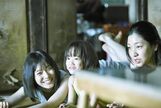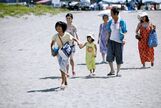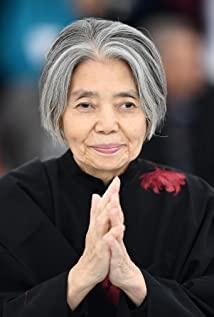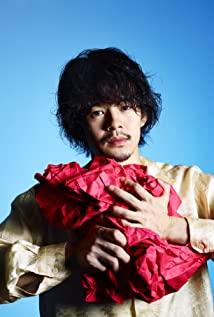It was Edible Hirokazu who won the Cannes Palme d'Or with "The Thief Family", and finally put an end to his previous 6 accompanying runs.
This is also the first time that a Japanese film won the Palme d'Or after a lapse of 21 years. The last Japanese director who won this honor was also the director of "Eel" in 1997, Masahira Imamura.
After the news of the award was passed back to Japan, although the mainstream public opinion was full of jubilation, there were also some harsh voices: it was another traitor who asked for an award.
Similar evaluations seem to often appear in East Asian directors: Zhang Yimou, Jia Zhangke, Jin Jide... Japanese media also specially created a term to describe those films that vilified the image of Japan’s national image in the international arena, called "National Humiliation" film movie".
Part of the Japanese reacted so strongly that I somewhat understood after watching this movie.
Because when I was watching the first half of the film, I was brainwashed by news such as "Japanese people are of high quality" and "Japan's economy is strong". I even doubted for a while: Is Japan really a developed country?
The movie "The Thief Family" is about six Japanese at the bottom of society. Although they have no blood relationship with each other, they formed a family by chance and gathered together in a dilapidated bungalow to keep warm.
There is a poster in the film, which shows a family of six sitting in the corridor enjoying the fireworks.
In the feature film, there are only 6 protagonists in the same shot, without fireworks in the sky. Because their yard is too small and surrounded by tall buildings, they can't see anything, they can only listen to the sound and imagine the appearance of fireworks.
With just this shot, we can see the family's status in the city: being squeezed, ignored, marginalized...
In the first scene of the film, "Dad" Shibata (played by Nakagawa Masaya) takes Xiangta to steal things in the supermarket. Their lives seem to be very poor, and even cheap daily necessities such as instant noodles and shampoo are stolen.
On the way home, "Dad" and Xiangta met a little girl who was unattended in the tree on the side of the road, so they took her home, and then "Mom" Shibata Shindai (Sakura Ando) found the wound on the tree. Learned that this little girl has been abused by her biological parents for a long time.
Although Shibata's family lives by stealing, they have a kind heart in their hearts. They can't bear to live on the streets in the cold winter, so they raise her as a daughter.
The tree is obedient and pitiful, and Xiangtai is just a little boy who should have been in school. Such two children can only choose between "living on the street" and "being a thief". Question the lack of social assistance in Japan.
Generally speaking, we think that people who degenerate into thieves must be idlers and lazy people. However, the Shibata family tells us that this is not the case.
In addition to stealing things, "Dad" originally had a job at the construction site. Later, he suffered a toe due to a work-related injury and had to go home to recuperate. He originally expected work-related injury insurance compensation, but he didn't get a penny. "Mom" is a woman worker in a laundry shop. She is greedy at work, but she can barely maintain enough food and clothing. After the economic downturn, she was also fired by the boss.
There are many scenes depicting the Shibata family eating in the film. Although there is no exaggerated performance of gorging, I can feel a kind of hunger from them. Especially the phrase "How come it's all cabbage?" The desire for meat reflects the family's living condition struggling with food and clothing.
Shibata Aki (Matsuoka Moyu) is a "sister-in-law" at home. As a pretty low-level girl, she quickly embarked on the road of betraying her hue.
Because the domestically released version was cut by 4 minutes, I didn't understand the nature of Yaji's work at first. On the surface, this job is similar to the kind of underground idols unique to Japan. It can provide soft pornographic services such as hugs, pillows, and heart-to-heart talks. Later, I learned that there were explicit erotic performances in the cut shots, so I was sure that it was the original sex.
We usually have the impression that the low-level girls who are willing to sell their hues may make money in one night equivalent to half a month's income of a working-class. However, Aki still lives in a dilapidated and cramped bungalow with Shibata's family. It seems that the competition in Japan is still fierce, and even the beauty of a "national beautiful girl" like Matsuoka Moyu can only maintain the living standards of China's "Miss Village in the City".
In fact, through the dialogue between Yaji and "mother" Xindai, we can learn that Xindai was also a sex worker before, and "dad" was her former client.
How terrible is this society when you can't get rid of the bottom life even if you sell your hue and dignity?
The only person in the family with a stable income is "grandma" (played by Shu Xilin). She has a monthly pension of tens of thousands of yuan, and she can also blackmail a support from her ex-husband's children. Although "grandma" has no blood relationship with them, she is willing to be "grabbed the old" because she is afraid that no one will send her away in a hundred years.
Soon after, the "grandma" passed away, leaving the family members who were already struggling to earn less income. In order to continue to receive the pension, the Shibata family decided to conceal the death of "grandma" and buried the body in the backyard.
From the girl who was abused by her biological parents to the pretense of receiving the pension of the deceased old man, these have real prototype cases in Japanese society, and they are also the source of inspiration for the director to create this film.
The story of the bottom of the society holding a group for warmth is not new. The ending of the domestic film "1942" is that the old man who escaped from famine played by Zhang Guoli met an orphan. Miles."
In the era of war and chaos, such a story is reasonable, but in modern society, simply describing the happy life of the bottom family is undoubtedly a bowl of poisonous chicken soup.
Is it the best solution for the bottom life to gather together abused children, betrayed girls, domestic abused wives, and unreliable elderly people, and rely on the loopholes in the law to live their lives?
Therefore, in the second half of the film, the director used an approximate reversal of the plot, giving each character a chance to have an inner monologue.
It turns out that under the appearance of Shibata's family newspaper group warming up and licking wounds, everyone has their own little ninety-nine. Although the days in the dilapidated bungalow are warm, it is not a sustainable life. After all, it is a dream to wake up.
The "mother" played by Sakura Ando should be the first to wake up from a dream.
In the crying scene that awakened, Ando Sakura contributed a wonderful performance. She did not wipe away the tears with her hands, but concealed her behavior of wiping the tears with the motion of wiping her hair, showing the unwillingness and pretending to be strong mentality to the fullest.
She once thought that blood relationship is not important at all, it is fetters that connect them together, as long as everyone takes care of each other, this is a complete and happy family.
Later, she realized that she and "Dad" were not suitable for the parents of two children, so she told Xiangta to find the clues of his biological parents, and she alone took all the guilt.
In the end, the members of this "thief family" went their separate ways. Some lived a better life, some returned to their original life, and some went to jail.
What does Hirokazu Kee want to express through this film?
Obviously, it is not the poisonous chicken soup that instills family warmth, but like NHK TV, which has also been criticized for being "traitor," filming those sex sellers, Internet cafe refugees, and widowed elderly people, showing the true side of life at the bottom, and uncovering the scars of Japanese society.
View more about Shoplifters reviews










